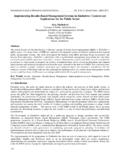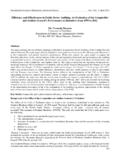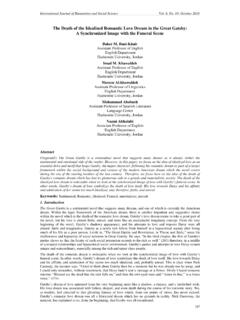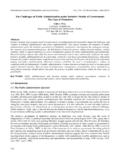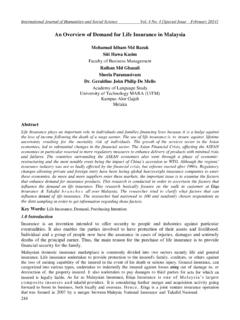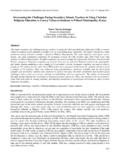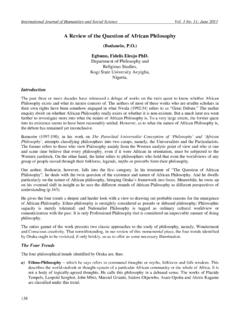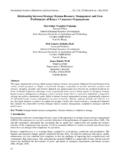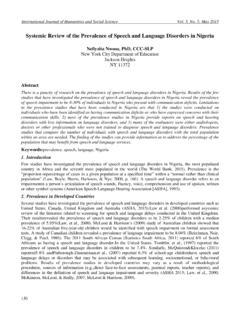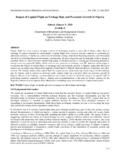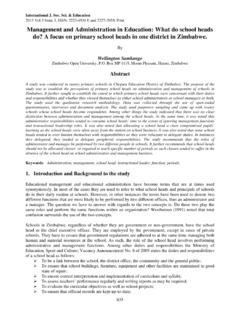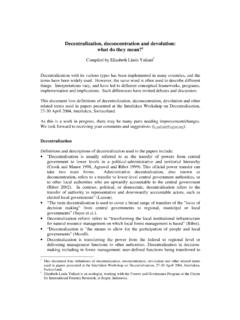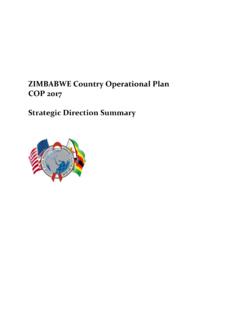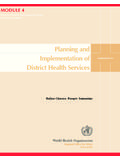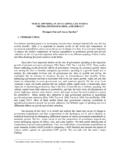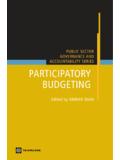Transcription of The Challenges of Self-Financing in Local …
1 International Journal of Humanities and Social Science Vol. 3 No. 11; June 2013 233 The Challenges of Self-Financing in Local authorities The Case of Zimbabwe Zhou Gideon & Chilunjika Alouis Department of Political and Administrative Studies University of Zimbabwe Abstract A vibrant Local authority system constitutes the bedrock for sound public administration and the promotion of bottom-up socioeconomic development. It enhances government responsiveness to Local communities and also serves as the forum for robust and sustainable grassroots participation.
2 The paper examines Self-Financing efforts in Local government authorities in Zimbabwe against the background of perceived declines in transfers from central government. Study findings indicate that while Local authorities in Zimbabwe exercise varying taxing and expenditure powers under the rubric of fiscal decentralisation, creating a buoyant Self-Financing base is compromised by interlocking factors that include continued central government grip, limited revenue base, failure to devise long range revenue optimising strategies, political interference, and an institutionalised culture of rent-seeking.
3 While property tax is a promising revenue source for Local authorities in Zimbabwe, it remains among the least tapped sources of tax revenue due to absence of fiscal cadastre information, lack of valuators, inaccurate valuations, and inept collection enforcement. Zimbabwe is yet to create an up to-date information base on commercial, mining, residential and agricultural activities. In both rural and urban areas, land ownership remains tenuous and therefore difficult to tax.
4 Rural Local authorities are yet to devise strategies to effectively mobilise royalties from mining and agricultural activities in their localities while urban Local authorities tend to rely on predatory user charges. Unfolding scenarios over the decades underline the need for a paradigmatic shift in Local authority Self-Financing strategies by placing more emphasis on property tax revenue collection and enhancing revenue planning and optimizing strategies, among others. Key Words: Local government financing , fiscal decentralisation, revenue sources, user pay principle, intergovernmental transfers Introduction The term Local authority denotes administrative bodies that are officially responsible for all the public services in specific geographical areas such as cities, towns, municipalities, counties and boards.
5 Local authorities are tasked with ensuring provision and maintenance of public services to Local residents through the utilisation of funds generated from the Local communities, in addition to loans and grants from the central government and other sources (Zimbabwe Institute, 2005). A wide, secure and buoyant revenue base is critical if Local authorities are to effectively execute their functions ( Local Government Finance Commission of Uganda, 2003). Local authorities must also possess some modicum of liberty to alter the level and composition of their revenue sources in line with the logic of fiscal decentralization.
6 Fiscal decentralisation devolves taxing and spending powers from the control of central government authorities to government authorities at sub-national levels ( Local Governance and Decentralisation, 2009, 16). This entails determining their sources of revenue, tax rates and levels of expenditure. According to Larson (2004) most Local government collection systems strive to achieve three goals, namely; to accelerate the receipt of available funds, to safeguard the government s cash and to keep banking costs to a minimum.
7 The term revenue generally denotes all incomes from taxes, fees (charges), fines, loans which Local authorities mobilize from within and outside their own jurisdictional arenas. Local authority collection systems vary depending on the size of jurisdiction, the payment methods allowed and the nature of revenues received (Larson, 2004, 452). Center for Promoting Ideas, USA 234 The core sources of revenues in the Local governments can be classified into internal and external sources.
8 The former covering pay rates, user charges, development levies, income generating projects and Local taxes while the later captures additional funds from outside the Local government which are provided in the form of government transfers, grants and loans, among others. However, over reliance on external revenue sources, increases the dominance of the central government on Local authority, reducing them to mere talking shops without finance to implement their decisions (Oluwu, 2010). Principles Governing Local Government financing Across the world, taxes constitute the major source of Local government revenue (Hyman, 1990, 675).
9 The essence of a tax is that the governing body demands a financial contribution towards the cost of its activities from a person or organization. There is no choice for the rate payer and there is sometimes no relationship between the amount paid and the form of benefit received. Underlined here is that revenue collection, be it at national or Local government level, should be guided by the general theory of tax design, namely that tax design and revenue collection should be based on principles of benefit-pay, economic efficiency, administrative convenience and equity (Goode, 1984; Musgrave and Musgrave, 1984; IMF, 2011; AFRODAD, 2011).
10 The benefit-pay (user pay) principle argues that taxes should be apportioned in relation to the benefits received from publicly provided goods and services. Economic efficiency principle argues that sound tax revenue collection should not be an impediment to Local investment and development. Administrative convenience calls for special consideration to both the enforcement aspect of the taxes and convenience to the taxpayers. A good tax system should be as simple as possible to administer for both taxpayers and the tax collector.
